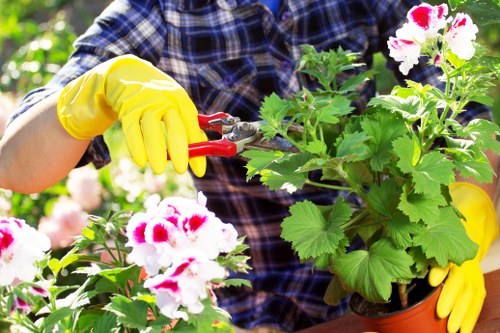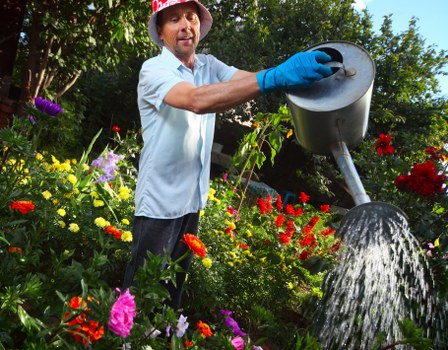Effective Oil Stain Removal for Driveways in Isle of Dogs

Oil stains on driveways are a common issue many homeowners face. In the bustling area of Isle of Dogs, where traffic is constant and accidents can happen, maintaining a clean driveway is essential not only for aesthetic purposes but also for safety and longevity.
Understanding how to effectively remove oil stains can save you time, money, and the hassle of dealing with unsightly marks. This guide delves into various methods and best practices tailored specifically for driveways in the Isle of Dogs area.
Whether you have a paved, concrete, or asphalt driveway, the techniques discussed here will help you tackle oil stains efficiently and restore your driveway's appearance.
Understanding the Causes of Oil Stains

Oil stains typically occur when vehicles leak oil or other automotive fluids onto the driveway surface. Common culprits include:
- Engine oil from your car
- Transmission fluid from trucks
- Brake fluid from service vehicles
Heavy traffic in areas like Isle of Dogs increases the likelihood of such leaks, making oil stain removal a necessary maintenance task.
Additionally, environmental factors such as rain can exacerbate oil stains by causing the oil to seep deeper into porous driveway materials.
Importance of Removing Oil Stains

Prompt removal of oil stains is crucial for several reasons:
- Prevents Surface Damage: Oil can penetrate and weaken driveway surfaces over time, leading to cracks and deterioration.
- Enhances Curb Appeal: A clean driveway enhances the overall appearance of your property.
- Reduces Slipperiness: Oil spills can create slippery surfaces, posing safety hazards.
Addressing oil stains early can extend the lifespan of your driveway and save you from costly repairs down the line.
Preparation Steps before Oil Stain Removal

Before diving into the removal process, it's essential to prepare adequately:
- Gather Necessary Supplies: Depending on the method you choose, you may need absorbent materials, cleaning solutions, brushes, or power washers.
- Wear Protective Gear: Gloves and safety goggles will protect you from harsh chemicals and debris.
- Clear the Area: Remove any vehicles, furniture, or other items from the driveway to ensure unhindered access.
Proper preparation ensures that the oil removal process is effective and minimizes potential damage to the driveway surface.
Additionally, assessing the severity of the stain will help you determine the most suitable removal method.
Effective Methods for Removing Oil Stains
Using Absorbent Materials

One of the simplest ways to tackle fresh oil stains is by using absorbent materials:
- Cat Litter: Spread cat litter over the stain and let it sit for several hours before sweeping it up.
- Baking Soda: Sprinkle baking soda on the stain to absorb the oil, then scrub with a brush.
These methods are effective for minor stains and can prevent the oil from seeping deeper into the driveway.
For best results, act quickly before the oil hardens and becomes more challenging to remove.
Homemade Cleaning Solutions
If you prefer eco-friendly options, homemade cleaning solutions can be a great alternative:
- Vinegar and Dish Soap: Mix equal parts vinegar and dish soap, apply to the stain, scrub, and rinse.
- Vegetable Oil and Salt: Apply vegetable oil to the stain, sprinkle salt, let it sit, then scrub and rinse.
These solutions are cost-effective and use readily available household items, making them accessible for most homeowners.
While they may require more elbow grease, they are safer for the environment and your driveway's integrity.
Commercial Oil Stain Removers
For stubborn or aged stains, commercial oil stain removers are often the most effective:
- Enzyme Cleaners: These break down the oil molecules, making them easier to wash away.
- Degreasers: Designed to tackle heavy-duty stains, degreasers can restore the driveway's appearance.
Always follow the manufacturer's instructions when using these products to ensure safety and effectiveness.
Ventilation is crucial, especially when working with potent chemicals prevalent in commercial cleaners.
Advanced Techniques
Pressure Washing
Pressure washing is an effective method for removing deep-seated oil stains:
- High-Pressure Jets: These can blast away oil and grime from the driveway surface.
- Hot Water Pressurized Cleaning: Using hot water enhances the cleaning process by breaking down the oil.
It's recommended to rent or invest in a good quality pressure washer for best results.
Remember to adjust the pressure settings based on your driveway material to prevent damage.
Sandblasting
Sandblasting is another advanced technique suitable for heavily stained driveways:
- Abrasive Material: Sand is propelled at high speed to remove oil and stains.
- Surface Preparation: This method also prepares the surface for sealing or painting.
Due to its intensity, sandblasting is best performed by professionals to avoid harming the driveway.
It's also essential to use protective gear to shield yourself from abrasive particles.
Sealing the Driveway After Cleaning
After removing oil stains, sealing your driveway is a wise preventive measure:
- Protective Barrier: Sealing creates a barrier that prevents oil from penetrating the surface.
- Enhanced Durability: It also prolongs the driveway's lifespan by shielding it from weather elements.
Choose a sealant compatible with your driveway material and apply it as per the manufacturer's guidelines.
Regular sealing, typically every two to three years, ensures continuous protection against oil stains.
Choosing the Right Products for Your Driveway
Selecting the appropriate products is crucial for effective oil stain removal:
- Eco-friendly Options: If you're environmentally conscious, opt for biodegradable cleaners that are safe for plants and pets.
- Cost-effective Solutions: Budget-friendly products are available that provide excellent results without breaking the bank.
Consider the severity of the stain and the driveway material when choosing a product to ensure optimal results.
Reading product reviews and seeking recommendations from local Isle of Dogs residents can also guide your decision.
Preventive Measures to Avoid Future Oil Stains
Prevention is always better than cure. Implementing these measures can minimize the occurrence of oil stains:
- Regular Vehicle Maintenance: Ensuring your vehicle is leak-free reduces the chances of oil spills.
- Use of Drip Pans: Placing drip pans under vehicles can catch any accidental leaks.
- Prompt Cleanup: Addressing spills immediately prevents oil from setting into the driveway.
By taking proactive steps, you can maintain a clean driveway and avoid the hassle of frequent stain removals.
Educating household members about responsible vehicle use also contributes to preventing oil stains.
Local Professional Services in Isle of Dogs
While DIY methods are effective, sometimes professional assistance is necessary:
- Expertise: Professionals have the knowledge and tools to handle stubborn or extensive stains.
- Time-Saving: Hiring experts saves you time and effort, allowing you to focus on other tasks.
- Guaranteed Results: Many services offer warranties or guarantees on their work.
When selecting a professional service, consider their reputation, customer reviews, and the range of services they offer.
Local businesses in Isle of Dogs are well-versed in the common challenges faced by residents, ensuring tailored solutions for your driveway.
Nearby Areas and Local Features Relevant to Oil Stain Removal

Isle of Dogs is surrounded by several areas where oil stain removal services are also in demand. Understanding these nearby locales can help you find specialized services close to home:
- Canary Wharf: A major business district with high vehicle traffic, leading to frequent oil stains on driveways.
- Greenwich: Known for its historic sites, maintaining clean driveways enhances the area's charm.
- Deptford: An area with diverse properties, requiring tailored oil removal solutions.
- West India Dock: Proximity to docks means exposure to various vehicle types, increasing the likelihood of oil leaks.
- Lewisham: Residential areas here benefit from regular driveway maintenance to uphold property values.
- Rotherhithe: With a mix of old and new properties, customized oil stain removal methods are often necessary.
- Blackwall: Industrial spots nearby may contribute to higher instances of oil stains on local driveways.
- Isle of Grain: A quieter area where preventive measures can significantly reduce oil stain occurrences.
- Silvertown: Its commercial landscape requires efficient oil removal to maintain clean streets and driveways.
- Poplar: Mixed-use areas here see a diverse range of vehicles, making versatile oil removal solutions essential.
- Green Bank: Residential properties in this area benefit from eco-friendly oil removal methods.
- Island Gardens: Scenic driveways in this locality require careful cleaning to preserve their beauty.
- South Dock: Close to heavy traffic routes, oil stain prevention and removal are critical.
- Hither Green: Suburban properties here use various driveway materials, necessitating specialized cleaning approaches.
- Wapping: Historic driveways charm the area but require gentle yet effective oil stain removal techniques.
Residents across these areas can benefit from the oil stain removal tips and services discussed, ensuring their driveways remain spotless and well-maintained.
Frequently Asked Questions
1. What is the best method for removing old oil stains from a concrete driveway?
The best method for removing old oil stains involves using a degreaser or an enzyme-based cleaner. Apply the product to the stain, let it sit as per the instructions, scrub with a stiff brush, and rinse thoroughly. For stubborn stains, repeat the process or consider pressure washing.
2. Can I use household items to remove oil stains, or should I opt for commercial products?
Household items like baking soda, vinegar, and dish soap can effectively remove fresh oil stains. However, for older or more persistent stains, commercial products designed specifically for oil removal may be more effective.
3. How can I prevent oil stains from forming on my driveway in the future?
Prevent oil stains by regularly maintaining your vehicle to prevent leaks, using drip pans under your car when parked, and promptly cleaning any spills. Sealing your driveway can also create a protective barrier against oil penetration.
4. Is pressure washing safe for all types of driveways?
Pressure washing is generally safe for concrete, asphalt, and paved driveways. However, it's essential to adjust the pressure settings based on your driveway material to avoid damage. When in doubt, consult with a professional.
5. When should I consider hiring a professional for oil stain removal?
If DIY methods fail to remove the stain, the oil has deeply penetrated the driveway, or you're dealing with a large area, it's advisable to hire a professional. Professionals have the expertise and equipment to handle challenging oil stains effectively.


